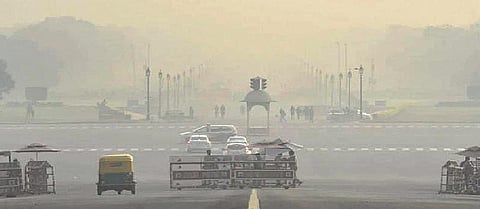Half-hearted attempts to fix Delhi air pollution
With the onset of winter round the corner, alarm bells are already ringing in the Delhi government and health circles over the annual rise in air pollution in the national capital. Given the density of vehicles on Delhi’s roads, one of the highest in the country, and its contribution to air pollution, Chief Minister Arvind Kejriwal has appealed to the people to avoid using private vehicles for a day every week. Whether the public heeds his call remains to be seen but past attempts to reduce air pollution through such ad hoc measures have borne little fruit.
Research studies have shown that the much touted odd-even experiment had little impact on the ground. The same is said about the drive to switch off vehicle engines while waiting at road crossings. It is quite clear that such half attempts do not serve any purpose. The government and policymakers must therefore look at other measures to fight this yearly winter phenomenon. This could be a mix of tough short-term steps and a long-term vision to tackle air pollution. Among the tough steps could be a three-year moratorium on the purchase of a second vehicle by private citizens. The burgeoning number of vehicles in Delhi is alarming and it needs to be urgently checked. Another step could be a similar time-bound ban on non-priority big construction activity. Currently, the Central Vista and the Pragati Maidan redevelopment are two major sources of construction dust.
To support these measures, long-term policies such as the beefing up of public transportation facilities are the need of the hour so that the public does not have to rely on private vehicles for travel. On this front, the Aam Aadmi Party government in Delhi has fallen woefully short. Not only is the condition of buses pitiable, the Delhi Transport Corporation has hardly added any new vehicles to its fleet. The result is depleting buses on the road. The only ray of hope for the citizens is the metro, whose network is not expanding at the required pace. Lastly, to discourage stubble burning, the state governments in north India need to collectively look at monetary incentives for farmers rather than penal action, which has not worked.

